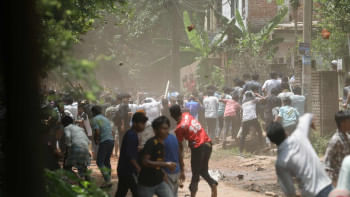Knitwear makers urged to be more competitive
The finance adviser has asked the knitwear manufacturers to become more competitive to sustain in the world market.
"The industry itself has to sustain in the competitive world market by exploring new avenues, improving quality of products and enhancing labour productivity," Dr AB Mirza Azizul Islam told a programme in Dhaka yesterday.
The suggestion came when a possible fall of knitwear exports is apprehended due to end of the European Union embargo on China from January 2008.
The Institute of Apparel Research & technology (IART) organised the programme at a city hotel marking the launch of its maiden research paper on Impact of Removing EU Safeguard Measures Against China.
The knitwear manufacturers sought government intervention in lobbying with their European counterparts so that the European Union continues such safeguard measures till 2008.
The adviser said the government is working with all the stakeholders to successfully face the possible challenges emerging from the discontinuation of imports growth cap on certain Chinese RMG products the European Commission imposed in 2005.
Mirza Aziz, also in charge of the ministry of commerce, said the government has succeeded in a considerable improvement in law and order situation and services at the Chittagong Port, which will help improve productivity and competitiveness of the sector.
He hoped that the readymade garments sector would be able to face the challenges successfully, if the growth cap is withdrawn from China, as the sector did following the phasing-out of the Multi Fiber Arrangement in 2005.
President of Bangladesh Knitwear Manufacturers and Exporters Association (BKMEA) Fazlul Haq informed the function that the industry experienced around 10 percent of shortfall in export orders during the peak summer season.
"We cannot find out the reason behind such shortfall, but we hope the situation will improve in September as August is a holiday period in Europe and America," Haq said.
The BKMEA chief suggested that the government should empower the Bangladesh mission in Geneva to negotiate with the European Union, but ironically the mission has been running without an ambassador for the last few months.
In his paper, MA Baset, director, BKMEA, said Bangladesh is not out of risk on removal of EU safeguard measures against China as the country has a narrow export basket.
He said the growth path is starting a declining mode, which emerges as a great concern for the majority knitwear makers of the country.
Baset felt it urgent to enhance bargaining capacity.
Mostafizur Rahman, research director, Centre for Policy Dialogue (CPD), pointed out the preference erosion that could hit Bangladesh RMG industry hard as the country will loss the duty facility it gets in EU and Canada.
He urged the RMG makers to maintain all environment and other social compliances in order to increase productivity of the sector.
In his speech Dr Stefan Frowein, head of the Delegation of European Commission, said a long-term democratic stability with business confidence will be key factors in sustaining Bangladesh's export performance.
He said countries like Bangladesh can hold their own against challenges of China and consolidate their position in key export markets.
Frowein added that cultivation of social compliance and decent working conditions are vital to position the garments industry competitive in the global market.
Dr Hafiz GA Siddiqui, vice chancellor, North South University, Debapriya Bhattacharya, executive director of Centre for Policy Dialogue (CPD), Mohammad Ali Taslim, professor of Economics at the Dhaka University, and Annisul Huq, former president, BGMEA, also spoke on the occasion.

 For all latest news, follow The Daily Star's Google News channel.
For all latest news, follow The Daily Star's Google News channel. 



Comments